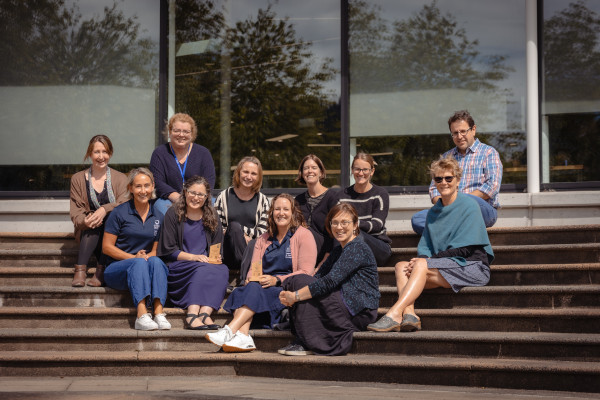- Tūhono home Hoki ki Tūhono
-
- Staff Directory
- Chief Executive Office Auckland International Office Corporate Services Finance Campus Services Functions and Catering Information Systems and Support Marketing, Communications and Engagement Learner Journey Academic Registry International Learner Services Te Punaka Ōwheo
- Learner Experience Academic Excellence Central Campus College of Community Development and Personal Wellbeing College of Engineering, Construction and Living Sciences College of Health College of Work Based Learning Open Education Resource/OERu Research and Postgraduate Studies Te Maru Pumanawa | College of Creative Practice and Enterprise
- Māori Development and Kaitohutohu Office People, Culture & Safety People and Culture Childcare Centre Te Ama Ako | Learning and Teaching Development Wellbeing and Safety Auckland Staff Directory Executive Office Academic Corporate Services Marketing and Business Development Human Resources Campus Quality and Programme Development
-
 Our people make a better world
Our people make a better world
We build the capabilities of individuals, organisations and communities and help them to realise their potential.
Staff Directory
-
- Tools
- Academic Integrity Declaration Form AIC applications dashboard Approved programmes Approved programme fees Centralised assessement repository Chemwatch Course evaluation and surveys CRM applications CRM customer service hub Delegations policy/process Disability and neurodiversity Dynamics 365 (CRM) EBS Ontrack EBS Report Email security personal portal Employment Matters / Solarworkplace / Performance reviews eTaxi eTV
- Financial variance reporting Hidden Disabilities Sunflower programme FCM travel intranet InPlace International entry requirements Knowledgebase articles Learner support dashboards Linkedin Learning Log a job with Marketing Login as an applicant Media consent form Microsoft 365 Moderation App Moodle OP Docs OP Docs - Publishing OP Image Libraries Performance Excellence Portal Pocket Lab (student healthcare) Product Evaluation Panel
- Policy Library Privacy Programme and course design/development Qualtrics XM RDS Remote access support portal Research Database Robertson Library Staff FAQs about graduation Status of Programmes Student intranet (Kāpehu) Study Abroad info for learners Taha Talks (videos for students) Tūhauora I Wellbeing resources Uniprint Vault Webexpenses Auckland tools
-
 Vault
Had an accident or near miss?
Log it here
Vault
Had an accident or near miss?
Log it here
-
- Communities
- Community AI Steering Committee Ally Network EBS Community of Interest EdTech Champions Health & Wellbeing Research Internal Evaluation Neurodiversity Professional Team Professoriate Proud@OP Student Support Website Advisory Group Web Champions Working under the Rainbow Project Learner Capability Trade Training Centre
- Committee Academic Committee Animals@OP Diversity and Equity Doctor of Professional Practice Committee Kaunihera Whakahaere - Leadership Council Internal Evaluation Learning & Teaching Leadership Team Library Committee Mental Health and Wellbeing Advisory Group Otago Polytechnic Board of Directors Pastoral Care Code Committee Programme Approvals Committee Research and Postgraduate Committee Research Ethics Committee Staff Subcommittee
- Think Tanks Mātauraka Our learners achieve educational success Pūtea Our financial success Tākata Our people, our team, our community Tiriti Our active commitment as a Treaty partner Tūroa Our commitment to be a sustainable and responsive organisation
-
 Create a community
Create a community
Do you have a community, committee or project that you'd like represented here?
Communities
-
- About OP
- Keep up to date All news All events All notices All blogs Share your info Create a news article Create an event Create a notice Create a blog
- Community and Partnerships Alumni and friends Education Foundation Operational information Academic calendar 2025 Academic calendar 2026 Current vacancies Dunedin campus map Our policies Topical FAQs
- Who we are About OP Commemorative sites Māori Strategic Framework OP merchandise Our history Our strategic priorities Pasifika Strategic Framework (2025-2030) Vision and Values Working for us OP job opportunities Wellbeing Calendar Working at OP
-
New Zealand: 0800 762 786
contact us
International: +64 3 477 3014
Waste to want. Overcoming patterns of failure in small food producers through innovative enterprise frameworks
Author: Timothy Lynch
Waste to Want. Overcoming patterns of failure in small food producers through innovative enterprise frameworks
Timothy Lynch
31 March 2014
Lynch, T. (2014). Waste to Want. Overcoming patterns of failure in small food producers through innovative enterprise frameworks. (A thesis submitted in partial fulfilment for the Master of Design Enterprise at Otago Polytechnic, Dunedin, New Zealand) [PDF 12.391 MB]
Abstract
This report describes the overall design process and entrepreneurial outputs of the third and final phase of the MDE.
The project comprises three components. First is the development and release of a fast-moving consumer good (FMCG) with suitable scalability for national and international distribution. Second is the use of a selective innovation frame- work for the rapid proto-typing of FMCG food products. Last is the development of a toolbox to help enable SME food producers to navigate the challenges of developing and distributing innovative and value-added food products.
For this to occur, innovation and creativity require a clear framework for viable and feasible development. To facilitate clarity in design thinking Vijay Kumar’s model of design innovation was used as a general methodology, customised at relevant stages according to the demands of the project.
This third phase report is the fusing of the knowledge gained in the first phase report where research was conducted on a local level at the Otago Farmers’ Market, and the second phase report where research was conducted on a national level for Foodstuffs.
In creating this fusion the third phase report seeks to examine three questions: 1) “If farmers markets are such good incubators how do you expand past the local level onto a national level?”; 2) “Is it possible to solve the failure rates in SME start up food businesses with design thinking?”; 3) “If the notion of sustainability can create leverage on a regional level, why not on a national level?”
The answers to these questions are intertwined, and while there may not be explicit answers individually to each of them, a larger holistic picture may occur.
Keywords: sustainable food production, quota management system, corporate and social responsibility, seafood harvesting, rapid prototyping, fast moving consumer goods
Timothy Lynch's primary supervisor was Nick Laird.
License
This thesis is available under a Creative Commons licence CC BY-NC-ND 4.0.
